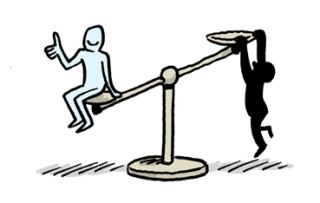Ireland as a multicultural society

Integration is defined in current Irish policy as the ‘ability to participate to the extent that a person needs and wishes in all of the major components of society without having to relinquish his or her own cultural identity’. For the 12.7 per cent of the population who are non-Irish nationals, achieving real integration requires concerted policy responses aimed at supporting education, job activation, tackling hate speech and racism and supporting cultural awareness.
According to Census 2016, there was a total of 535,475 non-Irish nationals – representing 200 different nations - living in Ireland on Census night. The main nationalities were Polish (23 per cent) and UK (19 per cent). Other nationalities with over 10,000 residents included USA, Brazil, France, Germany, India, Latvia, Lithuania, Romania and Spain. Non Irish nationals have a very different age profile to the rest of the population with half aged between 25 and 42 compared with a quarter of the Irish population. There are proportionately fewer children under 14 (12.3 per cent versus 22.5 per cent), and older people (4 per cent versus 13 per cent) among non-Irish nationals. The unemployment rate among non-Irish nationals was 15.4 per cent, compared with a rate of 12.6 per cent among the Irish population.
Racism in Ireland
According to the European Commission against Racism and Intolerance fifth Report on Ireland, while Ireland has made some progress to tackle racism in recent years, there is still more to be done, particularly in areas of hate speech and hate crimes; ethnic profiling; gender identity; supporting the needs of Travellers, particularly when it comes to accommodation; and supporting asylum seeker applications to be processed more efficiently and tackling specific areas of discrimination in Direct Provision.
In 2019, Ireland appeared before the United Nations Committee on the Elimination of Racial Discrimination (UNCERD). The Committee’s concluding observations published in January 2020, acknowledges some positive advances, such as the ratification of the Convention on the Rights of Persons with Disabilities in 2018;the official recognition of Travellers as an ethnic minority in 2017; the adoption of the Migration Integration Strategy 2017-2020, amongst others. However, the list of concerns and recommendations is still considerable, including the system of Direct Provision, Human Trafficking, data collection, the legislative Framework for the elimination of racial discrimination and the increasing incidence of racist hate speech.
Of concern is the number of reported racist incidents in 2020. The latest figures from the Irish Network Against Racism stated there were 700 (compared with 530 in 2019). Of these, 99 were linked to discrimination, 159 of these were criminal offences and hate speech accounted for 334 (almost double the number from 2019). 33 per cent of both victims of racist criminal acts and discrimination were of African descent.

GIVING A VOICE TO THOSE
WHO DON’T HAVE A VOICE
When you support Social Justice Ireland, you are tackling the causes of problems.
Knowing your Rights
A 2020 ESRI Report indicated that there was a gap between what people say publicly about their attitudes to minority groups in Ireland and what they are prepared to say when afforded anonymity. The study found that 66 per cent of people openly support more Black people coming to Ireland when asked the question directly, however, this decreases to 51 per cent when respondents were afforded anonymity. Fewer respondents (59 per cent) openly supported more Muslim immigration when asked directly, with a smaller decrease to 53 per cent when afforded anonymity.
The evidence produced by both the CSO and the ESRI/IHREC report suggests that equality legislation is not having the desired effect of combatting inequality and discrimination and that, even as recently as 2019, these issues affected 636,000 people living in Ireland. Ireland has experienced profound societal changes since the introduction of the first piece of equality legislation, this review presents a timely opportunity to reflect that.
The same report from the CSO indicated that nearly one in eight (11.8 per cent) people aged 18+, including those who had not experienced discrimination, had no knowledge or understanding of their rights under the Irish equality legislation, compared to 56.8 per cent who had a ‘moderate understanding’ of their rights and 31.4 per cent who had a ‘good understanding’.
It would appear that a person’s knowledge of their rights increases with their experience of discrimination, with almost one in three people who had experienced discrimination (32.3 per cent) having a ‘very good understanding’ of their rights. Educational attainment also plays a role here, with 46.3 per cent of people with a third level education and 35.2 per cent of persons with a post-Leaving Certificate education having the greatest understanding of their rights.
Of concern is that of those who experienced some form of discrimination and who reported having a very good understanding of their rights, 62.3 per cent took no action in respect of their experience of discrimination, while just 27.1 per cent took some form of verbal action.
It is clear that more is needed to raise awareness among the general population of the equality legislation, not just with those who are most at risk of experiencing discrimination, but also those who are at risk of perpetrating it. However, with just 3 per cent of the people who experienced discrimination making an official complaint, and just 1.7 per cent contacting the Gardaí, raising awareness of the legislation alone may not result in any greater use of the legislation to combat discrimination.
Social Justice Ireland urges Government to fully implement the recommendations of the Commission for the Elimination of Racial Discrimination.
